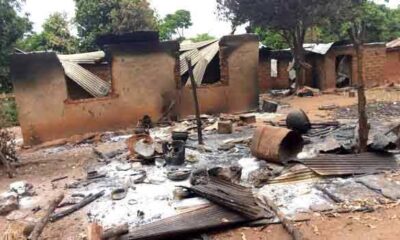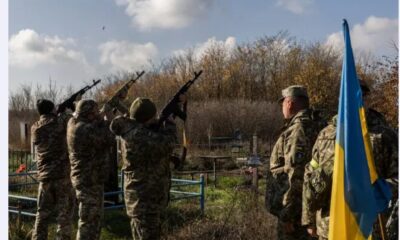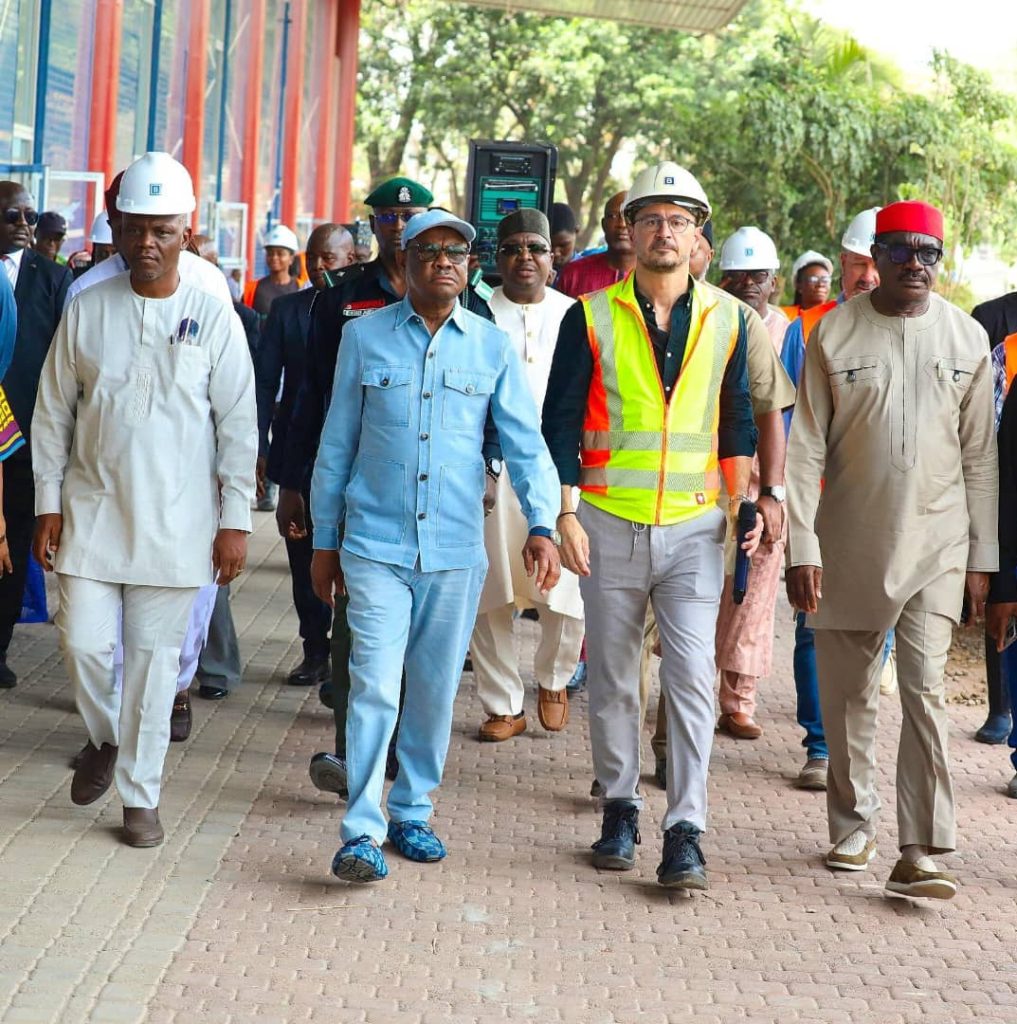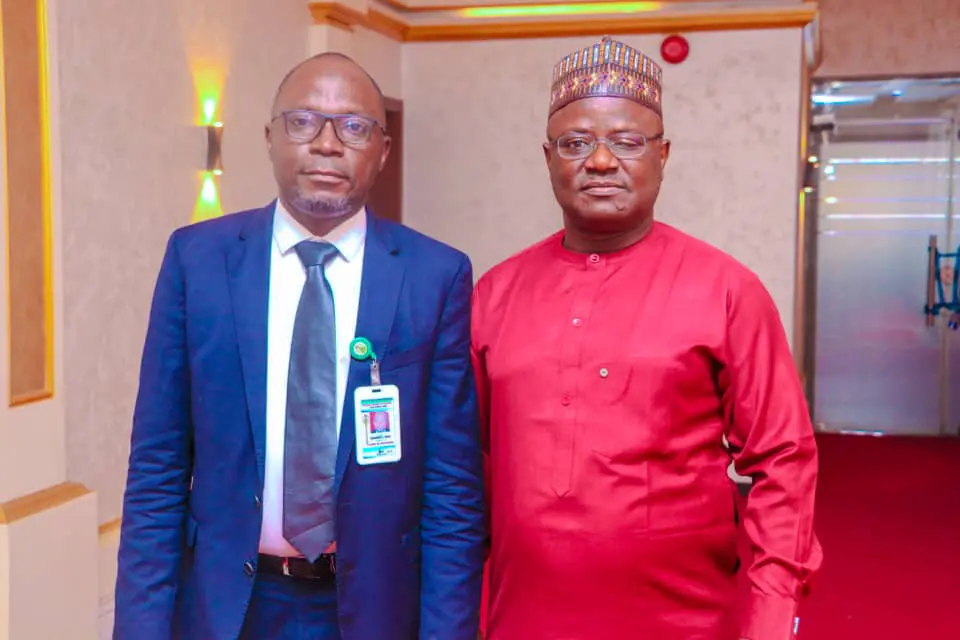Politics
Okpai IPP: Nwoko’s attack on Oborevwori unsavoury, blackmail – Ifeajika
Published
7 months agoon
By
Ekwutos Blog
The recent media attacks by the Senator representing Delta North Senatorial District, Senator Ned Nwoko, on Governor Sheriff Oborevwori over the Independent Power Plant[IPP) project in Okpai, Delta State, has been described as unsavoury and an attempt to coerce, stampede and blackmail the Governor before the public.
Executive Assistant to the Governor on Public Enlightenment (Projects and Policies), Mr Olisa Ifeajika, stated this at a news conference on Thursday in Asaba.
Ifeajika, who said that Nigeria operates a three-tier government system, with defined roles and functions, urged Senator Nwoko to focus on the job of bringing democratic dividends from the Federal Government to his constituency, the reason why he was elected by the people.
He said that Nwoko’s attempt to demonise Governor Oborevwori over the IPP Step-Down, a Federal Government project, was unfortunate and deliberate intention to create unnecessary tension in the state.
According to him, Nigeria’s Constitution operates three tiers of government, and we all know how government functions. At all levels, there is the Executive, the Legislative, and the Judiciary, and they complement each other to function well.
“As constituents of members of the National Assembly from the state, we look up to them to attract development in different dimensions from the Federal Government to the Constituencies.
“Senator Nwoko’s job, like those in the House of Assembly here in Delta, is to work closely with President Bola Tinubu and the Federal Executive Council to attract development to Delta North, and by extension, to the state.
“Members of the House of Assembly here are also expected to work closely with Governor Oborevwori to attract projects and dividends of democracy to their people just as Councilors are expected to work closely with Local Government Council Chairmen to attract projects to their various wards.
“The first phase of the IPP project in Okpai in Ndokwa East, whose work started in 2002 was inaugurated by then President Olusegun Obasanjo in 2005, with the capacity to generate 480 megawats of electricity.
“Senator Nwoko knows where the authority for power generation and distribution in the country lies. He knows that the national grid where generated electricity is warehoused and distributed is under federal control.
“He knew all these and found that there was need to get the management of the IPP to meet an agreement that was reached before now so that Okpai community and others around that area could have a step down.”
The Governor’s aide recalled that Senator Nwoko had on March 7, 2024, moved a motion on the floor of the Senate asking the IPP Joint Venture partners – Federal Government, represented by NNPCL, Agip and Conoco to complete the step-down project.
He disclosed that the motion also urged the Federal Government to investigate the delay in distributing 100 megawatts of electricity to Okpai and adjoining communities through the proposed step-down.
“The motion didn’t say that Delta State Government should carry out or complete the step-down. This is because the state government was not involved in any way.
“The did not also asked that Delta State Government should be investigated for the delay in distributing the 100 megawatts of electricity from the IPP.
“Senator Nwoko knew where to situate the motion, and it was properly situated. We, therefore, find his utterances a bit uncharitable for him to begin to armtwist Governor Oborevwori to pick the bill of the Okpai project, which was not in any way within the purview of the state government.
“Senator Nwoko is in Abuja to bring whatever is available there to Deltans. We see a situation where he was trying to coerce and stampede the governor as something akin to blackmail.
“It became more uncharitable when he said that the governor must bring out the money to pay the contractors upfront. This is very irregular”, he said.
“We expected Senator Nwoko to fight at the national level and make the Federal Government to get the project done and not to come to the state to coerce Governor Oborevwori to use state funds to complete the project.
“We call on Senator Nwoko to pursue the case with the Federal Government who owns the project. He should rather champion the reconstruction of federal roads that are in terrible conditions in his constituency, including Onicha-Ugbo-Idumuje-Ugboko-Ewohinmi-Abuja road, which passes through his community (Idumuje-Ugboko) directly.
“We are worried that as the only Senator the PDP has in the state, he is creating a scenario of frosty relationship with the governor. We expect a healthy and positive collaboration with the governor for effective development of the state.
“Oborevwori couldn’t have told the Senator that he was paying debts left for him by the Okowa administration, because he (Oborevwori) understands governance and knows that government is a continuum.
“Senator Nwoko should learn from the Member representing Ndokwa/Ukwuani Federal Constituency, Hon. Nnamdi Ezechi, who has been very vocal, fighting and championing the course of why he was elected, including the Ukpai IPP.”
Ifeajika, who was Chief Press Secretary to the immediate past Governor, also debunked insinuations that Governor Oborevwori was concentrating development in Warri and environs.
“There is this notion that the previous administration did so much in Asaba and neglected Warri and environs and it was explained over and over that it was necessary to deflood Warri before proper road construction could be done there, hence Warri wasn’t given so much attention like other areas.
“Now that the drains in Warri are almost completed, Governor Oborevwori has started giving the city the attention it deserves and it is commendable because it is our wish to see Warri come back to its glory days.
“Rather than lampoon Governor Oborevwori for giving Warri attention, he should be commended and encouraged to do more in other areas that are lagging in the development of the state”, Ifeajika added.
You may like


PRESIDENT TINUBU CONDEMNS LATEST ATTACK IN PLATEAU, CHARGES GOVERNOR MUTFWANG WITH RESOLVING UNDERLYING COMMUNAL ISSUES


Wike hails 95% implementation of FCT 2024 budget, unveils key projects


Benue Govt moves to block Peter Obi’s visit amid Alia’s defection rumours


Nasarawa Assembly confirms new clerk, deputy


Rivers: Refund N300m Fubara gave you – Ibas tells NBA


War: Ukraine loses 235 soldiers in 24 hours
Politics
Wike hails 95% implementation of FCT 2024 budget, unveils key projects
Published
3 hours agoon
April 14, 2025By
Ekwutos Blog
The Minister of the Federal Capital Territory (FCT), Barr. Ezenwo Nyesom Wike, has announced a landmark 95 percent implementation of the 2024 statutory budget, describing the achievement as unprecedented in the history of the FCT.
Wike made this known during a media briefing after inspecting several critical infrastructure projects across the Territory, including major roads at Life Camp and Katampe, as well as the ongoing renovation of the International Conference Centre, Abuja.
“I can tell you we’ve done not less than 95 percent of the budget implementation. That is historic. It has never happened before. And if you look at the projects there, you will see that there is no project that is in the 2024 budget that we have not touched,” he stated.
He attributed the progress to the National Assembly’s decision to extend the lifespan of the 2024 FCT statutory budget until June 2025, which he said enabled the Administration to sustain funding and accelerate delivery on major projects.
Wike also revealed that the 2025 statutory budget had already been submitted to the National Assembly and expressed hope that its timely passage would maintain the current momentum and support the completion of key infrastructure across the FCT.
During the tour, the Minister expressed satisfaction with the pace and quality of work, commending contractors for adhering to timelines and maintaining high standards.
Among the projects visited was the 4-kilometer six-lane dual carriageway linking Life Camp Junction to Ring Road III, currently under construction by Julius Berger. Once completed, the road will significantly improve connectivity between the districts of Kado, Karmo, Gwarimpa I, Dape, Ido-Gwari, Saburi, and Dei-Dei.
Another major project nearing completion is the access road from Nnamdi Azikiwe Expressway (by N16) to the Judges’ Quarters in Katampe District. This route will also connect the N20 (Wole Soyinka Way) in Jahi District with Katampe and Maitama, enhancing mobility in the area.
Wike expressed particular delight at the progress of the International Conference Centre renovation, which he described as rapidly advancing.
“These projects will be inaugurated by Mr. President during his second-year anniversary celebrations. We have gone to the International Conference Centre, which is almost ready. The first phase of the N5 will also be ready by the end of May,” he said.
Politics
Benue Govt moves to block Peter Obi’s visit amid Alia’s defection rumours
Published
4 hours agoon
April 14, 2025By
Ekwutos Blog
The Benue State Government is reportedly making moves to block a planned visit by Labour Party presidential candidate in the 2023 general election, Mr Peter Obi, to camps housing Internally Displaced Persons (IDPs) in the state.
Obi, whose post-election activities have prominently included humanitarian outreach to victims of violence across the country, was said to have planned a visit to some of the IDP camps in Benue.
The former Anambra State governor, in recent weeks, visited IDP camps in Plateau, Southern Kaduna and Nasarawa states, meeting with displaced families, donating relief materials and advocating for urgent government intervention.
His visit to Plateau State drew national attention after he held talks with Governor Caleb Mutfwang and visited victims of herdsmen attacks.
According to reliable sources, Obi’s team had reached out to the Benue State Emergency Management Agency (BSEMA) through its Executive Secretary, Sir James Iorpuu, to officially notify the agency and seek access to designated camps for the visit.
However, it appears the move has sparked a political storm within Benue’s corridors of power.
Top government officials reportedly advised Governor Alia against granting Obi access to the IDP camps, citing political undertones.
The visit, they argued, could be perceived as a calculated move by former Governor Samuel Ortom, a staunch supporter of Peter Obi during the 2023 presidential election, to revive his political relevance and embarrass the current administration.
Beyond the Ortom factor, sources also revealed that the decision to stop Obi’s visit was influenced by wider political calculations.
“It is believed that allowing Obi access at this time could fuel ongoing speculations that Governor Alia is considering leaving the All Progressives Congress (APC) amid tensions with some national leaders of the party.
“The governor is very conscious of his relationship with the Presidency and party hierarchy. Allowing Obi’s visit would not only trigger local political drama with Ortom but might also be interpreted in Abuja as a subtle alignment with the opposition at a time when Alia is battling internal party issues. This is not the kind of message he wants to send to the President.
“Such an association, especially with a high-profile opposition figure like Obi, could be politically damaging for Alia, who has been working to consolidate his hold on the state and maintain good standing with President Bola Tinubu’s administration,” a source told Ekwutosblog on Monday.
It would be recalled that in the February 25, 2023 presidential poll, Obi pulled a stunning performance in Benue State, securing over 308,000 votes, a figure that shocked many given the dominance traditionally enjoyed by the two major parties – APC and PDP.
His victory in the state was largely attributed to the support of Ortom and a groundswell of youth-driven, faith-based and middle-class backing.
Following this backdrop, sources disclosed that Governor Alia was convinced by his inner circle to forestall Obi’s visit to avoid reigniting political rivalries or offering Ortom and the Labour Party a platform to reassert influence in the state.
As a result, the governor reportedly instructed his Chief Press Secretary, Tersoo Kula, to issue a public statement cautioning against what it described as “unapproved high-profile visits” to the state.
“For anyone considering a visit to Benue State without the Governor’s knowledge, it is imperative to reconsider such plans, as the safety and security of individuals in this regard cannot be guaranteed,” he warned.
Though the statement fell short of directly naming Peter Obi, insiders confirmed that it was a veiled warning aimed at dissuading the former presidential candidate from proceeding with his proposed outreach.
One government source, speaking anonymously, said, “The governor is not comfortable with Obi’s visit, especially with the political undertones it carries.
“The camps are a sensitive issue and we cannot allow anyone to politicise the suffering of our displaced people.”
As of the time of filing this report, neither Obi’s camp nor the Labour Party has issued an official statement regarding the restriction.
However, a source close to the former governor disclosed that the visit was purely humanitarian and part of Obi’s ongoing national outreach to communities affected by violence and displacement.
Politics
Nasarawa Assembly confirms new clerk, deputy
Published
5 hours agoon
April 14, 2025By
Ekwutos Blog
The Nasarawa State House of Assembly resumed plenary on Monday after the Sallah break, confirming Mr. Ibrahim Abdulazeez Musa as the substantive Clerk of the House.
The confirmation was announced by the Speaker, Dr. Danladi Jatau, during proceedings in Lafia.
Musa had been serving in an acting capacity since December 6, 2023, following the ill health of the former Clerk, Mr. Ego Maikeffi Abashe, who passed away on March 1, 2025.
In the same session, the Speaker also announced the appointment of Mr. Paul Okugya as the Deputy Clerk of the House. Prior to his new role, Okugya served as Director of Protocol.
The Speaker congratulated both appointees on their elevation and wished them success in their new responsibilities.
Jatau also led members of the Assembly in observing a minute of silence in honour of the late Clerk, Mr. Abashe.
Meanwhile, two bills were introduced for first reading during the plenary session.
The first, a private member bill, titled “A Bill for a Law to Establish Lafia General Hospital and Other Related Matters Thereto,” was presented by Hon. Solomon Yakubu Akwashiki, who represents Lafia Central Constituency.
The motion was seconded by Barr. Esson Mairiga, member representing Lafia North Constituency.
The second bill on the order paper was “A Bill for a Law to Amend the Re-enacted Nasarawa State House of Assembly Service Commission Law 2023 and Other Incidental Matters Thereto.”
The motion for first reading was moved by the House Leader, Hon. Suleiman Azara, and seconded by the Minority Leader, Hon. Luka Iliya Zhekaba.
The bill has been scheduled for second reading on April 29, 2025, while deliberation on Hon. Akwashiki’s bill is slated for April 28, 2025.

PRESIDENT TINUBU CONDEMNS LATEST ATTACK IN PLATEAU, CHARGES GOVERNOR MUTFWANG WITH RESOLVING UNDERLYING COMMUNAL ISSUES

Wike hails 95% implementation of FCT 2024 budget, unveils key projects

Benue Govt moves to block Peter Obi’s visit amid Alia’s defection rumours
Trending

 Trending6 months ago
Trending6 months agoNYA demands release of ‘abducted’ Imo chairman, preaches good governance
- Business6 months ago
US court acquits Air Peace boss, slams Mayfield $4000 fine

 Politics6 months ago
Politics6 months agoMexico’s new president causes concern just weeks before the US elections
- Entertainment6 months ago
Bobrisky transferred from Immigration to FCID, spends night behind bars
- Entertainment6 months ago
Bobrisky falls ill in police custody, rushed to hospital

 Politics6 months ago
Politics6 months agoRussia bans imports of agro-products from Kazakhstan after refusal to join BRICS

 Politics6 months ago
Politics6 months agoPutin invites 20 world leaders
- Politics1 year ago
Nigerian Senate passes Bill seeking the establishment of the South East Development Commission.

